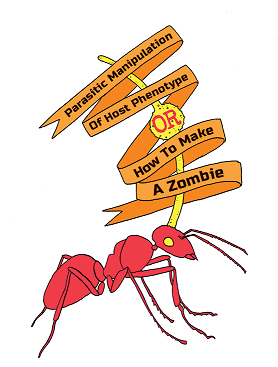SICB Annual Meeting 2014
January 3-7, 2014
Austin, TX
Symposium: Parasitic manipulation of host phenotype, or how to make a zombie

Nearly all animals are infected by parasites, and many parasites alter host phenotype after infection. For example, the fungus Orphiocordyceps unilateralis causes its ant host to leave its colony, climb up to a leaf, clamp its mandible around the leaf vein, and remain there until the ant dies at a location amenable to fungal spore dispersal. Other behavioral changes are more subtle (e.g., changes to activity patterns), but likely have important ecological and evolutionary implications. Parasites may alter the average value of host traits, correlations between traits (i.e., degree of phenotypic integration), and host plasticity. Despite their importance for host phenotype, research into these phenomena has been confined largely to parasitologists. This symposium seeks to foster an integrative approach to the study of parasite manipulation of host phenotype, with the goal of a more complete understanding of host phenotype, the mechanisms underlying host phenotypic expression, and the ecological and evolutionary implications of these phenotypic changes.
Sponsors:
SICB:
Division of Animal Behavior
Division of Invertebrate Biology
Division of Neurobiology
Other:
American Microscopical Society
(We have applied for funding from the NSF, and will be conducting a crowdfunding campaign to raise additional funds)
Organizers
- Kelly Weinersmith, University of California Davis
- Zen Faulkes, The University of Texas-Pan American
Speakers
S7.1-1 Monday, Jan. 6, 08:00 WEINERSMITH, K.L.*; HANNINEN, A.F.; SIH, A.; EARLEY, R.L.:
Euhaplorchis californiensis, a brain-infecting trematode parasite, is associated with changes in physiology and behavior in its killifish second intermediate host
S7.1-2 Monday, Jan. 6, 08:30 WEBSTER, J.P.*; KAUSHIK, M:
The impact of Toxoplasma gondii on host behaviour: can this parasite play a role in some cases of human schizophrenia?
S7.1-3 Monday, Jan. 6, 09:00 ADAMO, Shelley A*; KOVALKO , Ilya; STOLTZ, Don:
Love sick: a viral aphrodisiac in the cricket Gryllus texensis
S7.2-1 Monday, Jan. 6, 10:00 LIBERSAT, F.*; GAL, R:
Wasp Voodoo Rituals, Venom-Cocktails and the Zombification of Cockroach host.
S7.2-2 Monday, Jan. 6, 10:30 MOORE, J:
Parasites, Behavior and Prevention (?): How to stop worrying and learn to love Zombies
S7.2-3 Monday, Jan. 6, 11:00 FREDENSBORG, Brian L:
Jack-of-all-trades or Master of one? Does location of infection predict host specificity in behavior-manipulating parasites?
S7.2-4 Monday, Jan. 6, 11:30 MESCHER, M.C.:
Manipulation of host phenotypes by vector-borne pathogens of plants and animals
S7.3-1 Monday, Jan. 6, 13:30 HUGHES, DP:
Reconstructing the evolutionary history of behavioral manipulation
S7.3-2 Monday, Jan. 6, 14:00 LAFFERTY, K D*; KURIS, A:
Ecological consequences of host manipulation by parasites
S7.3-3 Monday, Jan. 6, 14:30 DE BEKKER, C.*; QUEVILLON, L.E.; SMITH, P.B.; PATTERSON, A.D.; HUGHES, D.P.:
Heterogeneous mechanisms underlying behavioral manipulation by a fungal parasite
S7.3-4 Monday, Jan. 6, 15:00 FAULKES, Z:
First, do no harm: Challenges to controlling another organism’s nervous system

